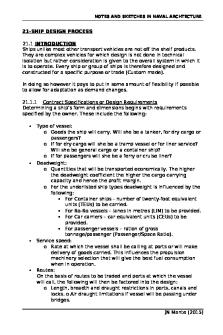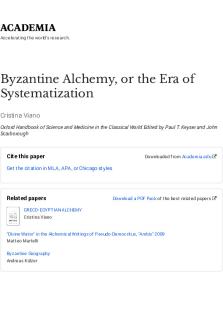Stranding, grounding, sinking, or capsize of the ship PDF

| Title | Stranding, grounding, sinking, or capsize of the ship |
|---|---|
| Course | Commercial Law |
| Institution | University of Chester |
| Pages | 1 |
| File Size | 39.1 KB |
| File Type | |
| Total Downloads | 93 |
| Total Views | 134 |
Summary
This document provides: Stranding, grounding, sinking, or capsize of the ship, General average sacrifice and general average contribution...
Description
Stranding, grounding, sinking, or capsize of the ship
Stranding’ means running aground; merely striking a rock and remaining stuck for a little over a minute is not a stranding. A stranding necessarily involves an accident but grounding need not; for example, where a ship is designed so that it can be deliberately moored so that as it falls with the tide, it rests on the sea or river bed, and prima facie only loss reasonably attributable to fortuitous grounding is covered.
General average sacrifice and general average contribution
In a sea voyage three interests may be at risk: the shipper’s interest in the cargo; the shipowner’s interest in the ship; and, if different, the carrier’s interest in freight charges. In consequence, they are in a sense involved in a ‘common marine adventure.
Under s 66(2) of the Marine Insurance Act 1906, for the sacrifice or expenditure to attract general average, it must have been extraordinary, voluntarily, and reasonably made, and in a time of danger for the purpose of preserving the property of at least two parties.
Under s 66(4) of the Marine Insurance Act 1906, in the case of a general average sacrifice, the assured may ‘recover in respect of the whole loss without having enforced his right of contribution from the other parties liable to contribute....
Similar Free PDFs

Grounding-techniques
- 2 Pages

Amortization and Sinking Funds
- 20 Pages

Tugas Metode Sinking Fund
- 9 Pages

Ship Construction
- 377 Pages

-Ship Design Process
- 1 Pages

SHIP Stability Board Question
- 47 Pages
Popular Institutions
- Tinajero National High School - Annex
- Politeknik Caltex Riau
- Yokohama City University
- SGT University
- University of Al-Qadisiyah
- Divine Word College of Vigan
- Techniek College Rotterdam
- Universidade de Santiago
- Universiti Teknologi MARA Cawangan Johor Kampus Pasir Gudang
- Poltekkes Kemenkes Yogyakarta
- Baguio City National High School
- Colegio san marcos
- preparatoria uno
- Centro de Bachillerato Tecnológico Industrial y de Servicios No. 107
- Dalian Maritime University
- Quang Trung Secondary School
- Colegio Tecnológico en Informática
- Corporación Regional de Educación Superior
- Grupo CEDVA
- Dar Al Uloom University
- Centro de Estudios Preuniversitarios de la Universidad Nacional de Ingeniería
- 上智大学
- Aakash International School, Nuna Majara
- San Felipe Neri Catholic School
- Kang Chiao International School - New Taipei City
- Misamis Occidental National High School
- Institución Educativa Escuela Normal Juan Ladrilleros
- Kolehiyo ng Pantukan
- Batanes State College
- Instituto Continental
- Sekolah Menengah Kejuruan Kesehatan Kaltara (Tarakan)
- Colegio de La Inmaculada Concepcion - Cebu









